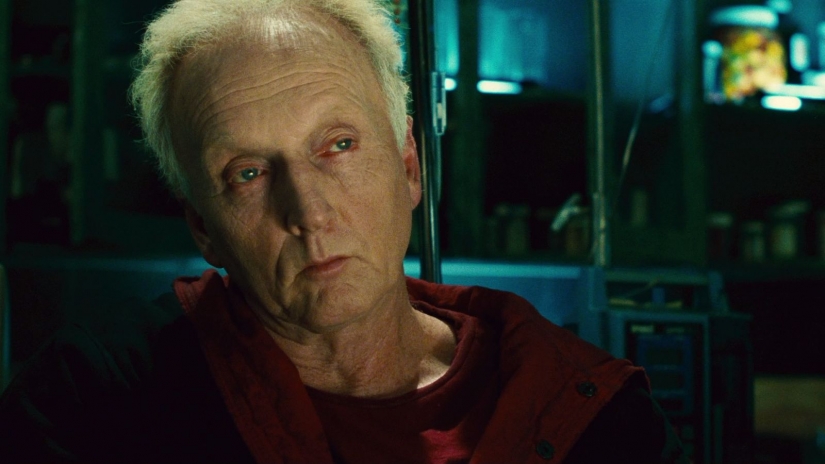Warning: this interview contains spoilers for several Saw films, and one for Four Corners, but it’s spoiler-free with regards to Jigsaw.
The Saw franchise began, back in 2004, with Tobin Bell’s John Kramer – aka The Jigsaw Killer – playing dead on the floor of a grimy bathroom. Leigh Whannell and James Wan’s micro-budget horror/thriller spawned six blood-spattered sequels, birthing a franchise that became synonymous with Halloween cinema trips.
But then, in 2012, came Saw 3D. The seventh film in the torture-stuffed series presented itself as The Final Chapter, going full circle – revisiting the bathroom from Saw – and tying up all the loose ends of John’s legacy. John died in Saw III and was autopsied in Saw IV, and then Saw 3D presented a seemingly final end to the in-fighting squabbles of his various apprentices. Game over. Or so we thought….
This Halloween, Jigsaw (formerly known as Saw: Legacy) will bring the Saw franchise back into cinemas. Tobin Bell’s iconic voice is heard in the trailers, but John Kramer’s exact involvement in the movie remains a mystery. Despite the film itself being shrouded in secrecy, we sat down in a swanky hotel room – back in September – for a lovely chat with the horror icon…
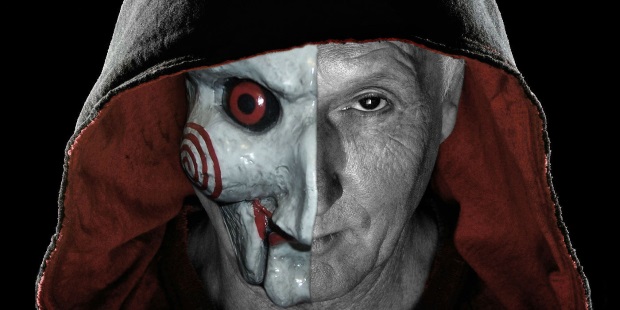
To start at the start, as it were, how did the first Saw movie come to you? Did they seek you out, or did you go and audition for it?
I met James Wan, and sat with him, and we talked about the script, which I had read. Had I seen their short film at that time? I’m not sure if I had seen their short, but I had read the script. And I sat with him and talked with him, and I gave him some of my thoughts about the script. And then he, very soon – the next day or whatever – cast me in the film.
The attractiveness of the film, for me, was: I had never worked with Danny Glover, and I wanted to work with him. I thought that three guys locked in a room was, like… no one was making films about three guys locked in a room. And it threw to Waiting For Godot, for me, on some level. And then, the ending, which I did not anticipate when I read the script.
I thought, if they shoot this well, it could be one of those really shocking moments in film, that, if you do one of those, in an entire career, it’s great. You know? It seems to me, there’s a movie called Four Corners, where John Turturro throws his mother out of the kitchen window, quite out of the fucking blue. And I was like, ‘what!’, you know? If you ever have a chance, see that film, because that moment is like… you don’t expect it, at all. And I like when there are very unexpected things in films.
And they did shoot it well. It had a very strong effect, which was great, you know?
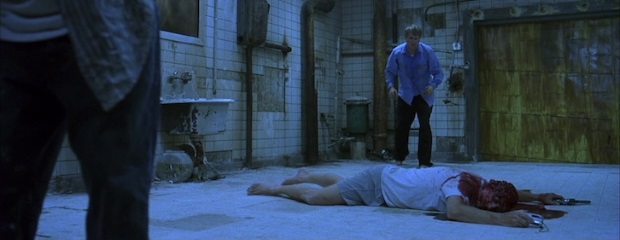
And were you put off at all by the amount of time that John spends on the floor in that script and in that film?
No, no. It’s not about [that]. I knew he was in the middle. I knew he was the fulcrum, on a seesaw, you know? And roles in films have nothing to do, really, with the size of the role. They have, for me, to do with how important they are, to the film, and to the story. So, I’ve played many roles that were not huge talking roles, but were vital.
So, lying on the floor! I was aware that I was going to have to do that. I was aware that half his head was blown off, and that I was going to have to deal with being wet most of the day. And that no one would want to have lunch with me, because I was so disgusting-looking, you know? And, so, all of those things came to mind. It would take three and a half hours every morning to build that prosthetic on my head so that it looked convincing. So, all of those things you think about.
And, of course, there are a few scenes in that first film where you do get to move around. Obviously, there’s the ending, and there’s also the –
Oh yes, there’s always outside the place flashback-y sort of things. Flashfowards. I think it’s mostly flashback. It’s just kind of a window into where this guy lives, you know?

And how much backstory information did you have to go on, at that time? Because obviously, you play John, in the scene where Danny Glover finds his secret base, and John is right in the middle of everything he does. Did they give you much indication of, like, how long has John been doing this and what are his motivations? Or did you not have that information yet, at that time?
Um… no. I didn’t give a lot of thought to Danny’s backstory. Mine was so sketchy, that, I gave a lot of thought to the cancer. His mind-set. Oh… people ask me, all the time, about favourite scenes… and what just occurred to me was, when I said mind-set, the moments before Saw 1, are filmed in… how many of these films have you seen?
All of them!
Oh okay. I think it’s either in three or four.
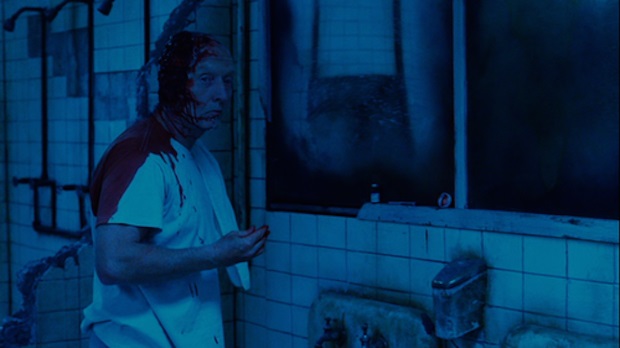
When they set up the bathroom?
Yes. When Amanda comes in and she says “What’s that?” I said “It relaxes your muscles.” You know? And she takes everything. And I said “It’s time”. And you see me lay down on the floor, and she walks out, and she stops, and she looks back, and she thinks about what’s going to happen, and she closes the door. I always forget about that scene, when [people ask about favourites]. Because I find that fascinating, the way he’s marking the walls, and using the sink, and I haven’t looked at that scene for a long time. But when I saw it written in that script, I’m not sure if it’s three or four… I don’t think it’s five. You see, the use of time is convoluted.
Yeah, and three and four are at the same time.
So, yeah, it’s hard for me sometimes to track or to remember; when the hell was that? Because the timeframe is the same as that, but we didn’t shoot it until five, or four, so, um, yeah. I can’t exactly remember what you asked me, about my mind-set and about Danny’s backstory and how much did I know about John’s backstory.
Um, I work very hard, on backstory, all the time, because I wanna know not just what I say, but what do I mean by what I say? Because you could say the same thing and mean three different things, five different things. The shading. So, I always wanna know as much as I can possibly know about a backstory, and you never are done. You can work on backstory all you want, and have a huge amount of backstory. Because backstory basically starts with one question: and that question, you answer it. And that becomes two questions.
Say the first question is where did he live? Say he lived in Portland, Oregon. Oh, Portland… what kind of neighbourhood? Say it was this kind of neighbourhood. And then, so, you start here and it just starts to get wider and wider and wider, you know? And how long has he lived there? How did he buy the house he lives in? Did he buy it? Is it rented? And it just keeps getting wider and wider, and then all of a sudden, you start to shoot. And you still don’t have all the fucking answers.
Hopefully, you have enough answers, to be able to say the lines knowledgably, and in a way where you… for me, as an actor, I’d go mad trying to say lines if I didn’t know what they meant.
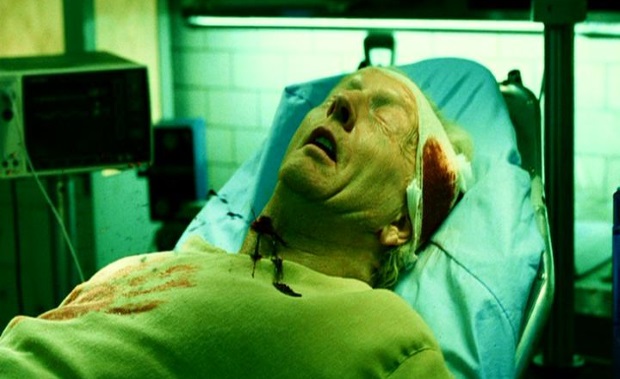
Speaking of the third and the fourth Saw films, I think it’s the end of three, when John dies. Were you shocked by the idea to kill off the main kind of presence in the franchise?
Yeah. Err, I… I’m an actor, so I was aware of what they were doing. I discussed it on some level with them. But it’s not my choice. I might’ve done it differently. And I think, frankly, a lot people involved might’ve done too. They had a trilogy in mind, at that point in time, so that I understood. So, I was well aware of what was going on, and what we were doing, and I made my plans accordingly.
Jumping forward a bit. Where you surprised, I guess it must have been a couple of years ago, when the call came about Jigsaw? Were you expecting to ever do Saw again?
I wouldn’t say expecting, but I was pleased, because I find him, a guy like King Lear. He’s a trained mechanical engineer, he’s an architect, he’s a philosopher, he’s a theologian. He’s huge, as a character, so I always… whenever you have a chance to play a guy like that, and have an opportunity to sort of punctuate the world that we live in with germs of ideas… err, and that’s the reason why the precepts and ideas in these films seem to resonate with fans the way we do, because of the world that we live in.
And, err, so yeah, I wouldn’t say I was surprised, but I always want to contribute, and develop more of him, because he’s so rich.

Can you say anything about what, in what capacity, John does contribute to this new film? Because it’s not been screened yet, and the trailers have your voice and they have Billy [the puppet], but they don’t really have you.
All I can tell you is that Saw films, if they’re anything, they have twists and turns and surprises. And if I told you what I did in the film, then, there would be no surprise. So, err… Peter and Michael Spierig, the directors, they’re very very smart guys, and they did an amazing job, and there’s some really great performances in it.
And, John Kramer is very strong, from the beginning, to the end. That’s about all I can say about his participation in it. But it continues his story, in a very clear way.
The trailers tease this mystery of whether it’s a copycat killer, or whether it’s something else: one of the characters we’ve seen before carrying on in John’s name, maybe. I’m really looking forward to finding out, I must say.
Oh good.
[I start trying to ask a question about the new traps here, but Tobin Bell cuts me off]
Do you write reviews?
I do, yeah.
Yes. Okay. I’d be interested to read your review, once it’s done. What were you saying?

[I try to start the traps question again…]
Because you’ve seen them all, I’d be interested.
[I give up on the traps question.]
I’ve been watching them again recently, actually, and I think it’s remarkable how well they all stitch together. Considering that lots of them written by different people and directed by different people, I think they did a great job making them all connect up.
Mmhmm. Yeah. I agree with that.
On that topic, actually… you mentioned the new directors, but this one also has new writers: Pete Goldfinger and Josh Stolberg. When their script came in, did it feel like a good fit with the spirit of the franchise so far? What did you think when you read it?
I like Josh a lot, and I like his writing. His spirit. And I think it’s tricky to come in, new, into a situation. I obviously saw the script once it was quite close to completed. But I have a lot of trust in the people at Lionsgate, and with the producers of the film, who… they know what they’re after.
And, very often, concept is of primary importance to filmmakers these days. And only after that concept is realised do actors get to see the script. So, I like Josh a lot. I liked working with him, and I’ve lots of really good creative conversations with him. So, I think he did a really great job with Jigsaw.
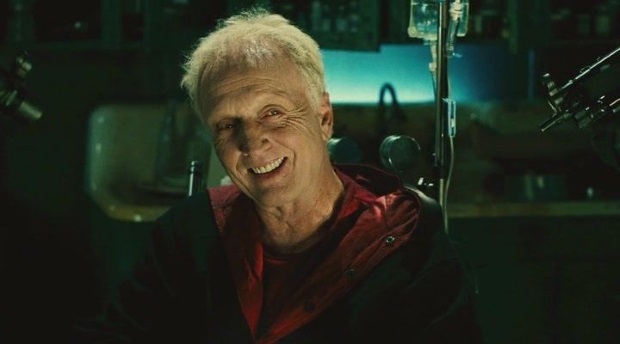
I know that, over the years, you’ve given notes and made contributions to the character of John.
Yes. Thank God.
Is there anything you’ve added to the character, or to the scripts or the films, that you’re particularly proud of?
Um, yeah, I would go back to… once [Saw] one was done, and we got to two, and he was up off the floor, we needed to know where he was coming from. All of that dialogue with Donnie Wahlberg in that movie… I took what they had… sometimes the difference between dialogue and dialogue is very small, but makes a huge difference.
So, the work that Donnie and I did on those scene… which, essentially, were two guys at a table… I mean, obviously he beats the crap out me at a certain point of time and we end up in a van, and I love the twist where all of a sudden you realise it’s not a kitchen, it’s a frikkin’ freight elevator… but yeah, that’s the first thing that comes to mind, all of those scenes, that articulate John Kramer’s mind-set at that moment in time, and his power, his strength, how he squeezes that guy. I love that. So that would be the first thing that came to mind.
It’s happened many times: through three, all of the scenes with Shawnee [Smith, who plays Amanda], we worked on many aspects of that. That’s one of the most rewarding parts of all the Saw films, for me, so, I’m a lucky man.
Tobin Bell, thank you very much!
Jigsaw is in UK cinemas from October 20th.

